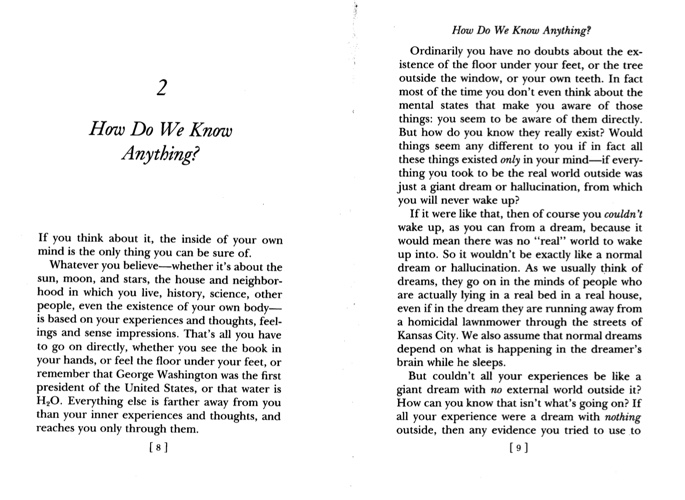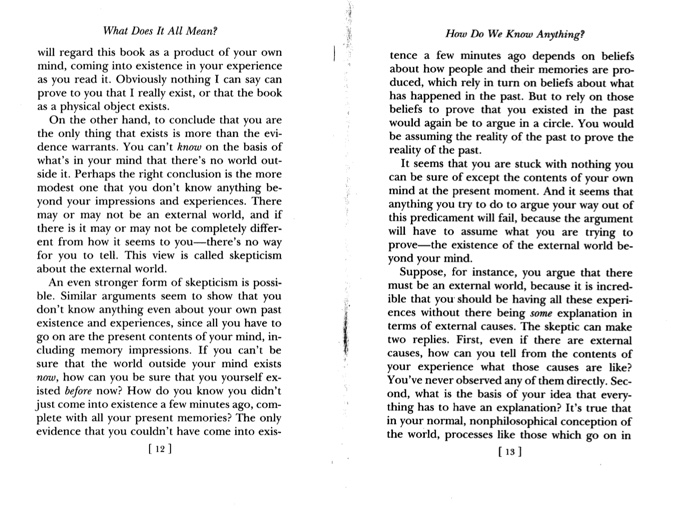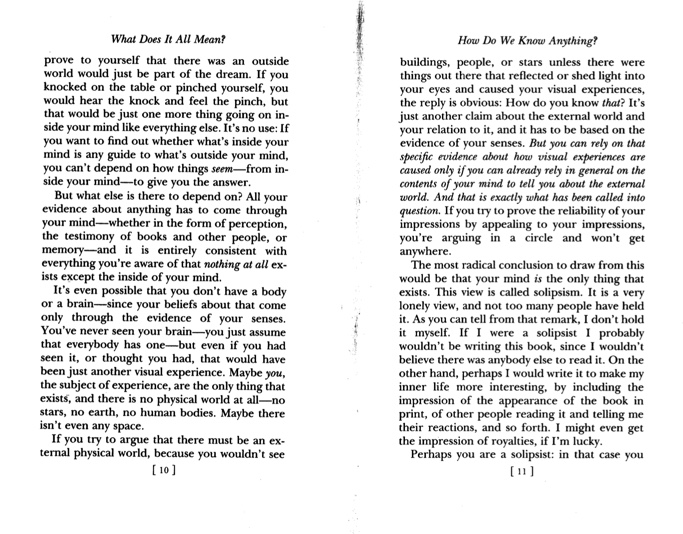


Please answer those questions from the above article,
- What is the only thing you can be sure of? (p. 8) Why is this the case?
- Why cant you rely on your senses to show that there is an external physical world? (p. 9)
- If there isnt an external world, what other possible explanation could one give for why we have sensory perceptions? (pp. 9-10)
- What is solipsism? (p 11)
- If you are a solipsist, can you claim to know that there is not external world? Yes or No. Be able to explain. (p. 12)
- There are two types of skepticism discussed in Chapter 2 skepticism about the external world and skepticism about past experiences. What is the difference between the two and which one is the stronger form? (pp. 12-13).
- If you were to argue, that there must be an external world, because it is incredible that you should be having all these experiences without there being some explanation in terms of external causes (p13), what two possible replies might the skeptic make? Be able to explain the responses.
2 How Do We Know Anything? If you think about it, the inside of your own mind is the only thing you can be sure of. Whatever you believe-whether it's about the sun, moon, and stars, the house and neighborhood in which you live, history, science, other people, even the existence of your own bodyis based on your experiences and thoughts, feelings and sense impressions. That's all you have to go on directly, whether you see the book in your hands, or feel the floor under your feet, or remember that George Washington was the first president of the United States, or that water is H2O. Everything else is farther away from you than your inner experiences and thoughts, and reaches you only through them. [8] Ordinarily you have no doubts about the existence of the floor under your feet, or the tree outside the window, or your own teeth. In fact most of the time you don't even think about the mental states that make you aware of those things: you seem to be aware of them directly. But how do you know they really exist? Would things seem any different to you if in fact all these things existed only in your mind-if everything you took to be the real world outside was just a giant dream or hallucination, from which you will never wake up? If it were like that, then of course you couldn't wake up, as you can from a dream, because it would mean there was no "real" world to wake up into. So it wouldn't be exactly like a normal dream or hallucination. As we usually think of dreams, they go on in the minds of people who are actually lying in a real bed in a real house, even if in the dream they are running away from a homicidal lawnmower through the streets of Kansas City. We also assume that normal dreams depend on what is happening in the dreamer's brain while he sleeps. But couldn't all your experiences be like a giant dream with no external world outside it? How can you know that isn't what's going on? If all your experience were a dream with nothing outside, then any evidence you tried to use to [9] What Does It All Mean? How Do We Know Anything? will regard this book as a product of your own mind, coming into existence in your experience as you read it. Obviously nothing I can say can prove to you that I really exist, or that the book as a physical object exists. On the other hand, to conclude that you are the only thing that exists is more than the evidence warrants. You can't know on the basis of what's in your mind that there's no world outside it. Perhaps the right conclusion is the more modest one that you don't know anything beyond your impressions and experiences. There may or may not be an external world, and if there is it may or may not be completely different from how it seems to you-there's no way for you to tell. This view is called skepticism about the external world. An even stronger form of skepticism is possible. Similar arguments seem to show that you don't know anything even about your own past existence and experiences, since all you have to go on are the present contents of your mind, including memory impressions. If you can't be sure that the world outside your mind exists now, how can you be sure that you yourself existed before now? How do you know you didn't just come into existence a few minutes ago, complete with all your present memories? The only evidence that you couldn't have come into exis- [12] tence a few minutes ago depends on beliefs about how people and their memories are produced, which rely in turn on beliefs about what has happened in the past. But to rely on those beliefs to prove that you existed in the past would again be to argue in a circle. You would be assuming the reality of the past to prove the reality of the past. It seems that you are stuck with nothing you can be sure of except the contents of your own mind at the present moment. And it seems that anything you try to do to argue your way out of this predicament will fail, because the argument will have to assume what you are trying to prove-the existence of the external world beyond your mind. Suppose, for instance, you argue that there must be an external world, because it is incredible that you should be having all these experiences without there being some explanation in terms of external causes. The skeptic can make two replies. First, even if there are external causes, how can you tell from the contents of your experience what those causes are like? You've never observed any of them directly. Second, what is the basis of your idea that everything has to have an explanation? It's true that in your normal, nonphilosophical conception of the world, processes like those which go on in [13] What Does It All Mean? prove to yourself that there was an outside world would just be part of the dream. If you knocked on the table or pinched yourself, you would hear the knock and feel the pinch, but that would be just one more thing going on inside your mind like everything else. It's no use: If you want to find out whether what's inside your mind is any guide to what's outside your mind, you can't depend on how things seem-from inside your mind-to give you the answer. But what else is there to depend on? All your evidence about anything has to come through your mind-whether in the form of perception, the testimony of books and other people, or memory-and it is entirely consistent with everything you're aware of that nothing at all exists except the inside of your mind. It's even possible that you don't have a body or a brain-since your beliefs about that come only through the evidence of your senses. You've never seen your brain-you just assume that everybody has one-but even if you had seen it, or thought you had, that would have been just another visual experience. Maybe you, the subject of experience, are the only thing that exists, and there is no physical world at all-no stars, no earth, no human bodies. Maybe there isn't even any space. If you try to argue that there must be an external physical world, because you wouldn't see [10] How Do We Know Anything? buildings, people, or stars unless there were things out there that reflected or shed light into your eyes and caused your visual experiences, the reply is obvious: How do you know that? It's just another claim about the external world and your relation to it, and it has to be based on the evidence of your senses. But you can rely on that specific evidence about how visual experiences are caused only if you can already rely in general on the contents of your mind to tell you about the external world. And that is exactly what has been called into question. If you try to prove the reliability of your impressions by appealing to your impressions, you're arguing in a circle and won't get anywhere. The most radical conclusion to draw from this would be that your mind is the only thing that exists. This view is called solipsism. It is a very lonely view, and not too many people have held it. As you can tell from that remark, I don't hold it myself. If I were a solipsist I probably wouldn't be writing this book, since I wouldn't believe there was anybody else to read it. On the other hand, perhaps I would write it to make my inner life more interesting, by including the impression of the appearance of the book in print, of other people reading it and telling me their reactions, and so forth. I might even get the impression of royalties, if I'm lucky. Perhaps you are a solipsist: in that case you [11]









